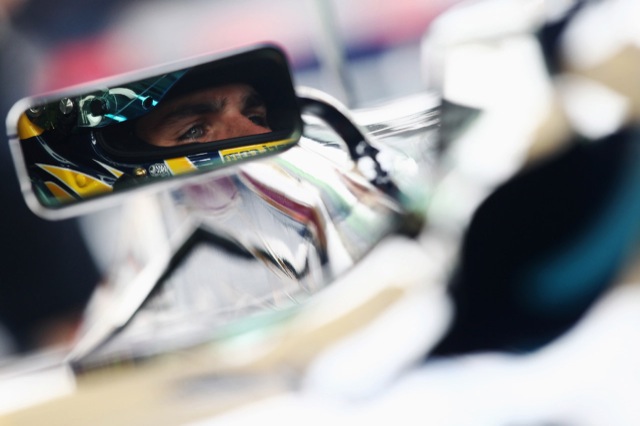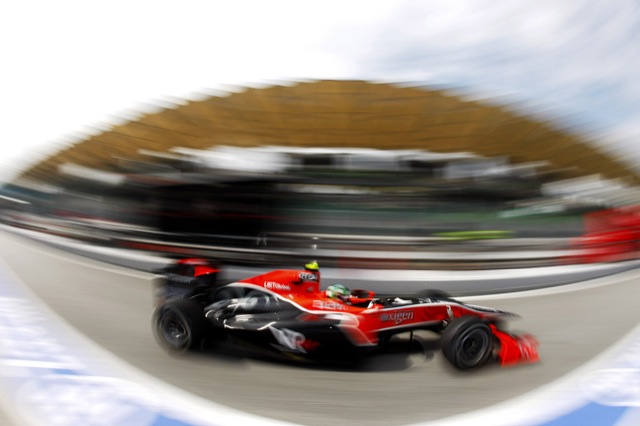I have just read a really good post over at F1 Links Heaven which asks if standard ECUs (Electronic Control Units) in Formula One is a good thing. One quote which I must share really stood out from the page.
On one hand we have to understand that the raison d’etre of F1 is as a showcase for technological advancement in the automotive industry. Get your car going as fast as you possibly can. It is not a charity where the poor get helped out. It is and always was a cut throat industry. Bernie Ecclestone himself has often been heard saying that anyone who can’t stand the heat should get out of the kitchen.
…
My quandry is that I realise my position can not be totally satisifed. I want the fastest cars with the best technology but I want the driver doing all his own work. So based on the premise that this can never be achieved, I have to pick a compromise that I think best suits F1.
So, should F1 continue to move towards more standardised parts in an increasing effort to cut out the cheats and loophole exploiters?
No.
Formula One is a showcase for all-things technologically advanced. It should remain as the premier motorsport in the world and continue to develop new and exciting ways of making a car go faster, but keeping the drivers skill at the forefront. For sure, electronic aids should be wiped out, making the car-control bias towards the driver skill, but standardising parts only serves to dull down the advancement in technology which helps make Formula One the sport that it is.
It is a tough question, and one I am just realising I don’t think I can answer. I keep contradicting myself with, “Driver skill is paramount, but F1 should remain at the cutting edge of technology.” I initially said no to the question, but now (having argued with myself for ten minutes) I’m saying maybe.
Anybody willing to help me make my mind up?


















Thanks for quoting me, and I think you’ve come to the same conclusion that I have – i.e. I don’t know the answer. 🙂 If the driver is the weakest link, then in order to make the car go faster he must be helped, but as soon as he is helped, he is no longer doing his own work, so it’s a vicious cycle, and I think compromise is the only answer.
Provided these standard ECU’s allow the teams enough leeway to customise their own systems in the way that they want, then I say maybe, just maybe, they are a good idea, but that’s a very cautious positive note that I may just as quickly take back !!
It is a tricky one to answer. But my real concern is if the FIA decide to implement this, what else will they do? In 2007 the formula returns to a single tyre manufacturer (Bridgestone), and I do not want F1 to become a standardised racing series. It has always been at the cutting edge of technology, and that is one reason why F1 is often considered the elite series, even above the US Oval racing.
As you say, the teams need to have some leeway to develop their own parts, but I think the policing needs to be better.
I remember McLarens third pedal rear braking thing they had a few years ago. I can remember thinking, “Wow, that is incredible”, but the other teams voted it to be an infringement of the rules and it was banned. Maybe the other teams were correct, or maybe they were just jealous?
Formula One always has been, and always should be a development place – somewhere for the latest cutting edge technology to be tried, used, abused and banned.
Traction Control, Anti-lock brakes, Turbochargers, have all been through the gauntlet of F1 development and are now common features on many road cars (and not just prestige models either), equally some of the more bizarre ideas that have been tried, and subsequently banned were ingenious to the extreme (remember the 6 wheeled F1 car, or the one with the fan to create downforce by suction?)
Forcing manufacturers to use a standard ECU will cripple the development they can do (or they’ll just find a way to bypass it and do something else anyway) – given that the ECU is the heart of the engine – surely it can’t be standardised without standardising the engines too?
Equally, it should be about racing, the best driver, combined with the best machine should win – so “enhancements” which are reducing the amount of skill the driver needs are wrong (I think “launch control” is exactly that) – the skill in racing is in picking the right line through the corner at the right speed, finding space to overtake (or closing the door to stop that Ferrari hurtling past) – this is what makes “standardised” formulas interesting – it’s all about driver skill, F1 is a team sport, so the combination of the mechanics, designers, pit-crew, and the driver are what produces a winning package.
Some very good points, Tom, and I’m pleased I’m not the only one who is having trouble deciding on this. Although I think it’ll be the McLaren that will be hurtling past in 2006 😉
I like standardised formulas, because I think they work well in lower formulae and feeder series. They help to show the talent of drivers and make it easier to compare. But when a driver reaches the pinnacle of his/her career in F1, I think standardising all the parts is unecessary. For sure, there needs to be constraints, but I don’t think all the parts that make a Formula One car should be the same.
It still impresses me that two teams who develop a car completely separately can produce machines that lap a circuit in identicle times to the thousandth of a second. Now that is Formula One!
Reference: Jerez Grand Prix 1997 – Villeneuve, Schumacher and Frentzen set pole with identicle times.
….. and on a slight tangent, if you think it will be “McLaren that will be hurtling past in 2006”, why don’t you enter http://www.linksheaven.com/forums/index.php?showtopic=5543 and predict the outcome of the WCC and the top 12 in the WDC plus the top qualifier and finisher within each team. I’m running it and it’s fun to see how wrong you can be with pre-season predictions 🙂
Indeed I have often made predictions about the outcome of the season, only to eat my words when I am wrong!
I’ll have a crack at making a prediction on the ECUs though – and that prediction is that the FIA will introduce them.
I think you’re right there. Regardless of your standpoint, it will be interesting to see its effect on F1 and the reactions given to it by the teams. I happen to think some manufacturer teams will leave because of it, and it will make others like VW think twice about entering.
I don’t agree with the original point. The raison d’etre of F1 is NOT to showcase technological advancement. That is a small side show at best. It is an entertainment business. Like any professional sport, corporates carefully place their investment so as to gain a return in terms of marketing.
Beyond a point, making the cars go quicker benefits only one of the 10 or 12 teams- the one that wins. The technological advancements more often than not make the sport less entertaining so if you’re not on the podium, or out front on the track, you have to be worried that the 1.5 billion or so invested across the sport is not reaching as large an audience as it could be if the sport was interesting.